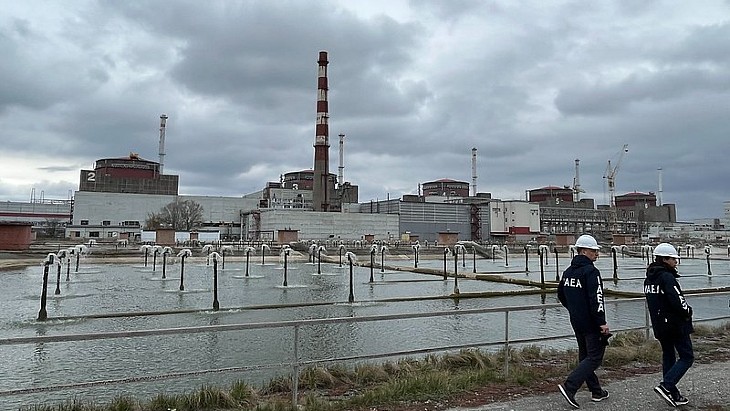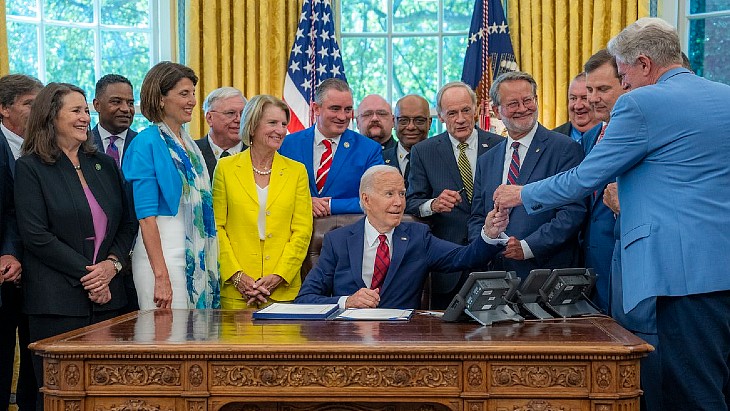UN motion calls for Zaporizhzhia plant's return to Ukrainian control
The United Nations General Assembly voted by 99 votes to 9, with 60 abstentions, for Russia to "immediately return the plant to the full control of the sovereign and competent authorities of Ukraine". Meanwhile the IAEA warns about the impact of the war on the city where most of the nuclear power plant workers live.

Extracts of United Nations resolution
The UN General Assembly resolution "demands that the Russian Federation urgently withdraw its military and other unauthorised personnel from the Zaporizhzhia nuclear power plant and immediately return the plant to the full control of the sovereign and competent authorities of Ukraine to ensure its safety and security and in order for the International Atomic Energy Agency to conduct safe, efficient and effective safeguards implementation in accordance with the comprehensive safeguards agreement and additional protocol of Ukraine, consistent with the repeated calls by the General Conference and the Board of Governors of the Agency".
It also "calls upon the Russian Federation, until it returns the Zaporizhzhia nuclear power plant of Ukraine to the full control of the sovereign and competent authorities of Ukraine, to provide the International Atomic Energy Agency Support and Assistance Mission to Zaporizhzhia with timely and full access to all areas at the plant that are important for nuclear safety and security in order to allow the Agency to report fully on the nuclear safety and security situation at the site".
And it calls upon "all parties to the armed conflict to implement fully the 'seven indispensable pillars for ensuring nuclear safety and security during an armed conflict' and the five concrete principles of the Director General of the International Atomic Energy Agency to help to ensure nuclear safety and security at the Zaporizhzhia nuclear power plant ... urges the Russian Federation to immediately remove all anti-personnel mines placed along the perimeter of the Zaporizhzhia nuclear power plant".
What was Russia's reaction?
Russia's First Deputy Permanent Representative to the UN, Dmitry Polyansky, was reported by the official Tass news agency as calling it "another nonconsensual, politicised draft [which] will have absolutely no effect on the ground, as the previous ones". The resolution was opposed by nine countries - Belarus, Burundi, North Korea, Cuba, Mali, Nicaragua, Russia, Syria and Eritrea - with the 60 abstaining including India and China.
Continuing IAEA concerns about safety at Zaporizhzhia
The International Atomic Energy Agency (IAEA), in its latest update on the situation at the Zaporizhzhia nuclear power plant (ZNPP), said it was concerned about military action in the area and especially its impact on the workers who live in the nearby town of Energodar which has suffered power cuts, water shortages and forest fires over recent days.
The IAEA said it had been told by the operators of ZNPP an attack had damaged an electrical transformer in a sub-station in Energodar as well as shelling which damaged a water pumping station. Director General Rafael Mariano Grossi said: "These latest attacks have not targeted the nuclear power plant directly, as in April. However, continued military activity in the region remains a serious concern and it is essential that the ... plant is protected to ensure nuclear safety and security. The sporadic loss of basic living essentials such as electricity and drinking water is affecting the staff and families at all nuclear power plants and facilities throughout Ukraine, potentially impacting on their ability to perform their important nuclear safety and security work."
The six unit nuclear power plant, which has been under Russian military control since early March 2022, is located on the frontline of the Russian and Ukrainian forces. There have been IAEA experts stationed at the site since September 2022 as part of efforts to support safety and security measures. They conduct regular walks and inspection of parts of the site, but have "continued to hear explosions and gunfire at various distances from the plant on a near daily basis over the past week".
They also reported that the recent hot weather had led to the level of the cooling pond dropping by about one centimetre a day, falling to below 15 metres for the first time since the Kakhovka dam was destroyed last year.
Elsewhere in Ukraine
The IAEA also has experts stationed at Ukraine's other nuclear power plants - Khmelnitsky, Rivne and South Ukraine, as well as at Chernobyl - and they report that nuclear safety and security is being maintained. The IAEA also says that a further four deliveries of equipment took place over the past week to support Ukraine in maintaining nuclear safety and security - bringing the total number of deliveries to 55 since the war began.
The Rivne nuclear power plant received measurement instruments, Khmelnitsky got filter absorbers, there was nuclear security equipment for State Enterprise USIE Izotop and also power supply units for the radiation monitoring network operated by the State Emergency Service of Ukraine.









_88592.jpg)
_66488.jpg)

